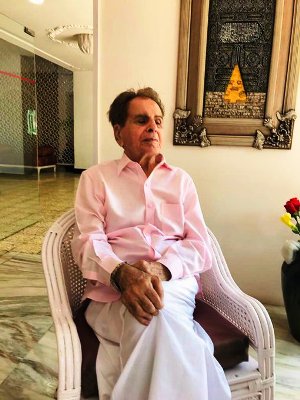A tribute to Dilip Kumar
With the demise of legendary actor Dilip Kumar (11 December 1922 – 7 July 2021) a whole era of Indian film making has come to an end. He was one of the last surviving actor from the Golden Age of filmmaking- an adage often used to describe the period from quit India movement to Independence, when film making reached its creative zenith. During this era the Progressive Writers Movement inspired film makers to work on socially relevant themes and considered their art as “Voice of the voiceless”. When film making was considered a serious business not just a source of entertainment but as a means to achieve just and equal society. As the late actor himself remarked once, “Today’s cinema and its audience, sadly, don’t have the kind of emotional give and take that the cinema of the 1950’s had. The basic reason was that cinema was the main source of entertainment those days and, more often than not, its content was taken seriously by most viewers. I am emphasizing this aspect to give credit to the directors who shouldered serious moral responsibility in our times when they chose to make films that had deep social relevance and implications for the audience’.
Belonging to a traditional pathan family from Peshawar, Yusuf Khan was renamed Dilip Kumar by Devika Rani, who wanted a more dramatic name, for the fluent Urdu speaking handsome lad, who she was to launch in her upcoming film, Jwar Bhata. The film marked the start of the actor’s journey into films, an association that lasted for more than 50 years. All the generations of cinema gores have been equally enthralled by the legend’s acting mettle. However not many would be aware of the fact that he was an equally great human being, loved and immensely respected by all his colleagues and associates, a devoted family man, loyal friend and a responsible citizen. Having grown up in a house that had such distinguished visitors as Maulana Abul Kalam Azad, Saadat Hasan Manto and Mirza Ghulam Ahmad it’s no surprise that Dilip Kumar was one of the earliest intellectual actor of the Bombay industry.
Never shying away from social responsibility, from choosing films that had social relevance and meaningful messages, to leading troupes to Himalayan borders to boost the morale of the border Security Force Personnel, to being handcuffed and jailed as a “Gandhiwala” for his anti-British Stand, are real life instances that made Dilip a vowed nationalist and a responsible citizen of the country.
As renowned film maker Mahesh Bhatt once said, `the plural heritage, which is the bedrock of this nation, radiates from his entire being, not only on the screen but in real life as well’. As noted script writer Salim Khan observed, `Yousuf Khan bin Mohammad Sarwar Khan, alias Dilip Kumar, struck an emotional rapport with audiences many decades ago and broke the barriers of caste, country, religion, language and region. …..Dilip Sahab’s phenomenal popularity symbolizes secularism, which has been the inner strength of India. It is through the roles that he played that he created a variety of possible icons for the cinema –viewing public and in a complete way this was reflected in India as it developed in a myriad ways : socially, culturally, politically’. The image that refuses to leave my mind while going through the above quote is the image from K.Asif’s Mughal E Azam, where Shehenshah Akbar is seen celebrating Janmashtami with his wife Jodha. Yes Dilip Sahab was perhaps the last surviving icon of the Ganga Jamuni Tehzeeb of India. May he find peace wherever he is and May all his fans and followers always preserve and nurture the country of his dreams.




The Brief. Sign up to receive the top stories you need to know right now.